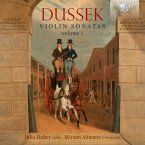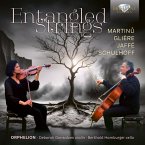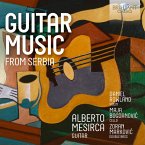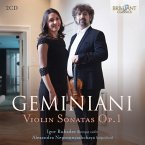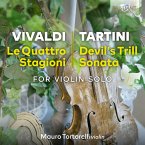There's an aura of mystery that surrounds the music of Leone Sinigaglia, and yet in his time he was esteemed and supported by the finest musicians of the period, from Dvorák (with whom he studied in Bohemia, and who was responsible for nurturing his interest in folk music) to Nikisch, from Mahler to Furtwängler, from Toscanini to Kreisler. As pianist Massimiliano Génot explains in his liner notes, Sinigaglia was very much a victim of historical circumstance, his Viennese base causing him to suffer after Italy's withdrawal from the Triple Alliance, following the outbreak of the First World War, and the subsequent demise of German culture; he also had to contend with rising anti-Semitism, not to mention the fact that Italian taste of the time was oriented towards opera and singing rather than instrumental and chamber music, his two preferred genres. And yet Sinigaglia's inspiration was profoundly lyrical, with a propensity for melodic writing - one of the best examples is his 'swansong', the second movement of the Violin Sonata Op.44, which features on this album. And Sinigaglia was not without his triumphs: his Piedmontese Dances Op.31 for orchestra, performed in 250 cities before 1922, rivalled in popularity the dances by Brahms and Dvorák; and he scored a great success with the Overture Le Baruffe Chiozzotte, whose brio, strength and comic vitality characterise the brilliant four-hand reduction found on this recording. Convinced of what he describes as 'the manifest injustice of an historical judgement that has condemned Sinigaglia for too long to oblivion', Massimiliano Génot has, together with his sister, violinist Alessandra, aimed to bring the composer's cause to the attention of modern listeners, uniting Sinigaglia's entire piano works and presenting them alongside other musical gems and transcriptions as detailed above. Both natives of Turin, the composer's home town, the Génot duo's affinity for the composer is naturally a special one, and they deliver confident, robust performances which aim to cast light on the composer's 'strong will to match expressive authenticity and formal perfection'. These will hopefully go some way towards furthering public appreciation for a composer who undoubtedly deserves to be better known. Leone Sinigaglia (1868 - 1944) was a cosmopolitan intellectual, who lived in Germany, Tchechoslowakia, where he formed close friendships with Johannes Brahms and Antonin Dvorák respectively. Of Jewish origin he died under Nazi terror in his native Turin. He was highly respected by Mahler, Fürtwängler, Nikisch and Toscanini, who premiered his orchestral works in America. Sinigaglia's musical language, rooted in the German tradition of Schumann, Brahms and Dvoak, is surprisingly original and personal. His chamber music on is a delightful find, full of subtle harmonic and melodic nuances, and occasionally inspired by the folk music of Piemontese (his native country, where he also was a respected and adventurous mountaineer..). Excellent performance by Alessandra and Massimiliano Génot, natives of Turin, like Sinigaglia. Other information: Recorded in Italy in 2009. Contains liner notes written by the artists especially for this release. Contains a biography of the composer. Contains biographies of the artists.
| CD | |||
| 1 | La Baruffe Chiozzotte op. 32 (Auszug) | ||
| 2 | Klavierstücke op. 24 Nr. 1-2 | ||
| 3 | Nr. 2 Humoreske | 00:05:06 | |
| 4 | Fogli d'album op. 7 Nr. 1-5 (für Klavier) | ||
| 5 | Nr. 2 Madrigale rustico | 00:01:34 | |
| 6 | Nr. 3 Nostalgia | 00:01:22 | |
| 7 | Nr. 4 Così va il mondo, bimba mia | 00:00:58 | |
| 8 | Nr. 5 Scherzino | 00:01:30 | |
| 9 | Staccato-Etüde für Klavier op. 11 | 00:02:50 | |
| 10 | Sonate für Violine und Klavier op. 44 | ||
| 11 | 2. Adagio | 00:09:12 | |
| 12 | 3. Allegro con spirito | 00:08:39 | |
| 13 | Danza piemontese op. 31 Nr. 1 (Fassung für Violine und Klavier) | 00:08:20 | |



